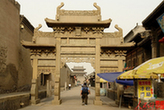When judges in Sweden awarded Mo Yan the 2012 Nobel Prize in Lit -erature and he was suddenly thrust into the world’s limelight, he was not sitting in front of the TV waiting for the news, as he doesn’t want his grandson to grow up with TV. At the time Mo Yan was in his hometown, Gaomi, a city in Shandong Province, where he returns every autumn from Beijing. As he explained, “I like to spend time with my father and fellow villagers, to be close to the earth and witness the dramatic changes that are happening in rural China, and to better understand what farmers are thinking.”
Mo Yan is already quite well known internationally. As early as 1988, his novel Red Sorghum Clan was adapted for the silver screen as Red Sorghum with the screenplay written by Mo Yan himself. The movie played to audiences around the world and won director Zhang Yimou the Golden Bear Award at the 38th Berlin International Film Festival.
Anna Gustafsson Chen, a Swedish translator who has helped Mo Yan publish some of his works in Sweden, says that China’s territory on the literature world map has in the past been sparse and not considered important. Therefore, the Nobel Prize Committee’s acknowledgement of Mo Yan’s importance is a triumph for Chinese literature.
Scrutinizing Human nature
Mo was awarded the Nobel Prize in Literature for his work as a writer “who with hallucinatory realism merges folk tales, history and the contemporary.” But Mo Yan himself thinks that the most poignant element of his writing is its portrayal of his people. As he says, “What I’m doing is to write about humans from their perspectives. I believe such works can transcend regional, ethnic and racial limitations.”
Born in 1955 as Guan Moye to a rural family in Gaomi County, now Gaomi City, in Shandong Province, his choice of the pen name Mo Yan, meaning “don’t speak,” was closely related to his experiences growing up. He completed primary school in the heat of the “cultural revolution” (1966-1976). Because his family was tagged middle-class peasantry – a discriminated, non-proletarian status during the period of “class struggles” – and he was at odds with his teacher, he lost his right to attend middle school. So he started to work in the field in his early teens and “did farm work that should not have been done by children.” In those years Mo Yan would murmur to himself, causing his parents and other villagers to suspect that there was something men -tally wrong with him. He was, however, doing this to avoid trouble by talking less to other people.
Mo Yan is frank about his reasons for pursuing writing as a career. “On one hand, it was a practical step to change my life; on the other, I felt that I had much to say and hence the impulse and desire to write,” he said, adding, “I wanted to tell my life, the things I had seen, to other people in an artistic way.”





Why not rent a boyfriend, or girlfriend to please parents during the Spring Festival?